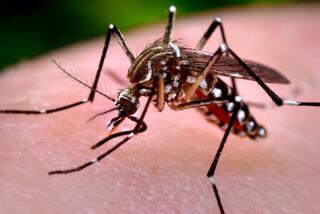Budget Woes Cited in Syphilis Outbreak
- Share via
The top health official for Los Angeles County on Thursday countered charges that his agency has mishandled the county’s syphilis outbreak, arguing that any shortcomings may be traceable to severe under-financing of county health services.
Robert C. Gates, director of the county Department of Health Services, said the department is still looking into the charges made by the county’s head of disease control programs. But said he believed the department’s principle problem is its tightened budget.
“Have we done enough to control the syphilis epidemic?” Gates asked rhetorically at a meeting of the county Public Health Commission. “It may be we conclude the answer is no and the reason why is the money isn’t there.”
The special meeting was called to take testimony from Dr. Shirley Fannin, the health department official who charged last month that her superiors watered down her warnings early last year about the causes and extent of the outbreak.
Fannin’s allegations, included in a memorandum to her superiors, prompted the county Board of Supervisors last week to call for an investigation into the handling of the outbreak. Gates said his department will report its findings early in June.
Rate Nearly Quintuples
The rate of infectious syphilis has nearly quintupled since 1985 in parts of southern Los Angeles County. County health officials said the rates in those areas are the highest they have seen since shortly after penicillin became widely available in 1943.
On Thursday, dozens of county health workers took vacation time to turn out for the meeting of the Public Health Commission, a group that advises the Board of Supervisors. The crowd filled the hearing room and overflowed into the hall.
In her testimony, Fannin reiterated her charge that public health programs have received short shrift in the department. She called for “a separate office of public health or a separate department or a separate something” to allow improved handling of public health.
Fannin suggested that hospitals and other personal health services have shouldered out preventive services, such as communicable disease control. She said the seeming lack of priority given to public health have left nurses and field investigators demoralized.
“You’re saying, ‘Do more for less,’ ” said Fannin, associate deputy director for disease control programs. “You reach a point when it’s not possible. Then the wheels begin to fall off the engine. And I believe that’s happening now.”
Before Fannin spoke, Gates stated that financing for public health services had kept pace with funding for other obligations. But he said the entire department begins each fiscal year with from $80 million to $100 million less than what it needs simply to maintain its status quo.
More to Read
Sign up for Essential California
The most important California stories and recommendations in your inbox every morning.
You may occasionally receive promotional content from the Los Angeles Times.










